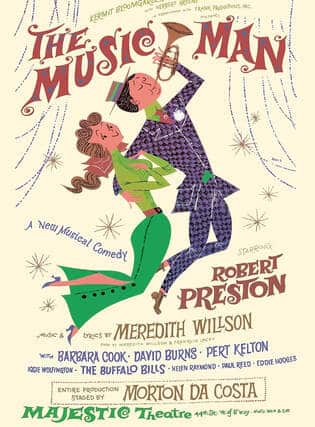Ruth Leon recommends…. Meredith Wilson – America’s Music Man
Ruth Leon recommendsMeredith Willson – America’s Music Man
Those of us who only know his name as the man who wrote The Music Man will be fascinated as I was to find out just how important Meredith Willson was in the history of not only the American musical theatre, but also of popular music, and the concert hall. I hadn’t realised that he scored films for Charlie Chaplin, wrote popular songs performed by the likes of Frank Sinatra and The Beatles, and was a world class flautist under the batons of John Philip Sousa and Arturo Toscanini.
He excelled in all of these and during WW2 he was in charge of all music for the American military. He loved his hometown, Mason City, Iowa, which of course was the model for River City in his massive musical theatre hit.
In addition to The Music Man which is constantly being revived somewhere in the world, and recently on Broadway, he also wrote The Unsinkable Molly Brown, an international hit in its day, and Here’s Love, a less successful Broadway musicalisation of the classic movie Miracle on 34th Street.
He was a pioneer in the early days of radio and television and wrote hundreds of songs that became popular and often newsworthy. He was at the centre of American popular music for many years. Who knew?
This is a traditional old-fashioned biographical documentary from Iowa Public Television Station, somewhat plodding in places, but it’s the story of an artist we thought we knew and find we didn’t, and that, to me, is irresistible.
Sutton Foster is the narrator, and there are interviews with many music luminaries.






A great talent to be sure. He did work with the Armed Forces Radio network during WW II but I’m not sure it’s correct to say that he was “in charge of all music for the American military.”
In the 1960s and 70s Temple University hosted a summer music festival featuring the Pittsburgh Symphony Orchestra at Temple’s Ambler, PA, campus outside Philadelphia. In 1972 a $20 ticket gave you access to all the rehearsals. Willson was the guest conductor for a Pops program that included an interesting piece by Henry Hadley, the title of which I no longer remember. He also programmed (as he was probably expected to) a suite from “The Music Man”. The orchestra was being less than cooperative and seemed to consider the music as not worthy of their time. Willson finally had enough and said, “Go ahead and snicker if you want to but it’s made me a couple million.”
Willson was also a very gregarious and pleasant gentleman. In the American Bicentennial year, 1976, I went to his Brentwood, CA home and interviewed him for a paper I was writing on American music. He was a great source and inspirational. His book “But He Didn’t Know the Territory” is a wonderful and at times funny book. He signed my copy that I still have.
Who knew? Well I think you had a better chance of knowing if you grew up in the US. I remember his television specials that featured lots and lots of music, singing and band music, and his Chicken Fat song was blared at you in school gym class to get you to exercise (Robert Preston being the singer) more or less at the urging of President Kennedy. I am sure it is on YouTube somewhere.
My brother and I can still sing the “Chicken Fat” song, having been in grade school in the early 1960’s.
https://youtu.be/EFofqe26t-4
A long lasting legacy as well: In 1991, Rosemary Willson, widow of Meredith Willson, contributed $5 million toward the $35 million fund the Juilliard school was raising to pay for the new residence hall for students. Meredith Willson attended the Institute of Musical Art, in the 1920’s, which became The Juilliard School.
You misspelled Willson’s name: common but terrible error… please proof your headlines when writing about rep you don’t know anything about.
Meredith scored 3 films
The Lost Zeppilin on in 1929, The Great Dictator in 1940, and The Little Foxes in 1941.
Two really interesting clasdical symphonies, both available on Naxos.
Although it celebrates Americana, The Music Man is actually quite subversive in some ways.